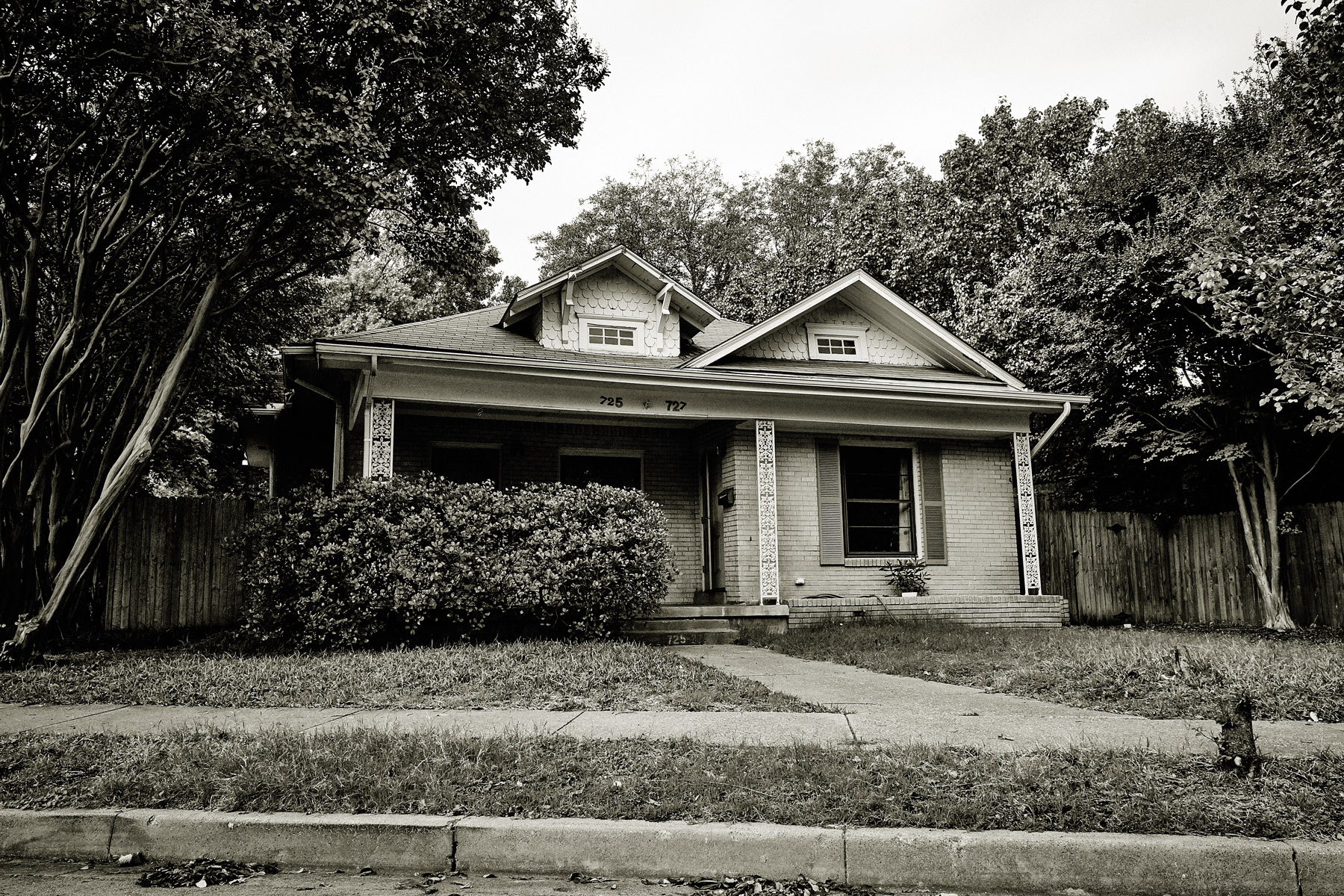You’d only ever hear from Ronnie Shumway at night, around the time most people on that quiet street in Winnetka Heights were trying to go to bed. Sometimes I’d just lie there, listening to his screams echo through the neighborhood. If it wasn’t too late, my roommate and I would stand on the front porch of our brick duplex and watch, with a mixture of revulsion and amusement. Shumway would mow his lawn at 10 in the evening. He’d stalk from the front yard to the back, or stand behind the broad crepe myrtle in the darkened recesses of his front porch, our own splenetic Boo Radley. His larynx-scouring diatribes were so vulgar, his roaring so thunderous, that it verged on performance. His ire was largely reserved for Jews and blacks, but it also had an inchoate, undirected quality, addressing no one on the street and all of us.
His episodes weren’t frightening so much as they were the sole source of titillation on an otherwise dull street. Shumway was the dog who would bark at you something fierce, though he’d never leave the porch to bite. After a while, the novelty wore off, and I began to ignore him.
He was a large, fleshy man, about 6-foot-2, with thin, wobbly-looking legs and a pendulous gut. I can’t recall ever seeing him leave that house or being visited by any guests. I’m told he lived there with his mother until she died, and that he has a sister with whom he does not speak. Otherwise, Shumway was alone.
When my lease was up in the summer of 2013, I moved into another apartment in North Oak Cliff, far out of earshot, and never gave the man a second thought. It wasn’t until more than two years later, in September, when I heard that human remains had been found at an unspecified address on North Winnetka Avenue, that I thought of Shumway again. He had apparently sold the house in June, and the new owner was inspecting the source of a fetid smell emanating from what appeared to be a pile of compost and leaves. But sources at the scene say that as he began to remove the chaff, he found a hummock of poorly mixed concrete that had been poured into a rectangle of stacked masonry blocks and garden bricks. The new owner, Fred Robertson, who declined to comment for this story, assumed an animal must have crawled inside the structure and died. He chipped away at layer after layer of concrete with a crowbar. When he broke through to the cavity inside the slipshod tomb, he saw the rib cage. There was no concrete floor to the structure, and the corpse had decomposed into the earth. Even a neighbor across the street caught the scent of putrefaction. “It smelled like catfish stink bait,” he says.
Robertson called to a man who lived down the street (he asked not to be identified because of the possibility that a killer remains at large). “When I saw the trash bags,” the neighbor recalls, “I looked the other way.”
He said, “Robertson asked, ‘What do you think?’ ”
“I think you should call the police,” the neighbor replied.
Before long, the fire department’s Urban Search and Rescue team arrived, followed by a medical examiner. The corpse had retained some suppurating flesh, so it couldn’t have been there for all that long. But it was also so badly decomposed that no one could be sure who it was, or even if the body belonged to a man or woman. No one could say whether it was 57-year-old Ronnie Shumway or someone else.
•••
We’d all assumed he was utterly isolated, but as it turned out, Shumway’s black box of a life contained more than any of us suspected. To our shock—and dismay—he had been a DART bus driver until his resignation was emailed to his superiors in April. For a year, he shared his home with a boarder and fellow bus driver named Ruben Wheeler, whom he evicted in the spring of 2014. The arrangement was rent-free, provided Wheeler completed some remodeling work.
“Ron had an ulterior motive. I think he was liking guys,” Wheeler says. “He was hoping I’d start liking him. I told him I’m strictly heterosexual. After that, he’d do all types of things to disturb me, walking around the house butt naked with a gun.”
The police showed up a few times but nothing would ever happen, he says. To the authorities, Shumway was cantankerous but otherwise harmless. He had some priors for assault, drug possession, and “evading detention,” but the charges all dated back to the ’80s and early ’90s. His record since then was quiet, even if he wasn’t.
“I never let myself get that close to Ron, especially when he was drunk,” Wheeler says. “When he’s drunk, he’s on one side [of the house], and I’m on the other side. He’s raging and hollering in the middle of the night, like he’s dealing with a demon. I really felt sorry for the man. He needed somebody. All his folks was gone. I never met anybody like that. He’d tell me, ‘You the only kin I have in the world.’ ”
Wheeler says he hasn’t seen Shumway since he moved out. That fall, the house at 725 N. Winnetka Avenue had new tenants. They were young men, and now a place that rarely saw a visitor bustled with the comings and goings of strangers. No one saw much of him anymore. The hollering at the little Craftsman house with the wide crepe myrtle had ceased. “The last time I saw Ronnie Shumway was last fall [2014],” says a neighbor who had lived near him for the better part of 30 years. “He was having a big yard sale. He looked very stressed, very unhealthy.”
Another neighbor saw him as late as March, when he offered to assist her with a heavy item. Shumway looked gaunt. “He could barely help me move a bookcase,” she says.
Then, as if by some miracle, the lonely man who had appeared so obviously disturbed announced with a cheery Facebook post the day before he resigned from DART that he had just entered into a romantic relationship: Found me a cowboy and he actually lives on a ranch. I’m going to be his Ranch Hand 🙂 None of his neighbors could quite picture it. How could a man as volatile as Shumway end up living some cattleman’s idyll near Austin?
He had led an active social life, but only on social media. His Twitter feed was filled with near-daily tweets of well-endowed black men. And he counted some 600 Facebook friends. But those I spoke with had never actually met Shumway in person. The only one I could find who had was as stumped as the rest of us. He hadn’t heard from Shumway since June 13. “I was worried about him because we would speak every day, and it was strange when he didn’t wish me a birthday wish,” says Antonio Evans, a friend from Austin. Evans kept calling and texting until Shumway finally responded. He claims Shumway told him he was staying with a man near Lake Travis but refused to give Evans a name.
Evans wanted to know why Shumway had been so uncommunicative of late. “He said he gets my messages, but he can’t respond back due to the guy being very jealous,” he says. “So I said, ‘If you need me to help you back to Dallas, I will.’ And he said, ‘I know you will.’ ”
That was the last Evans heard from him. The phone number he has for Shumway—the same number I found listed in Wheeler’s eviction papers—has been disconnected.
A man from—oddly enough—Dallas, Pennsylvania, with whom he had been romantic telephonically and on Facebook, tells me Shumway confessed in a drunken stupor to killing his ex-boyfriend. At the time, Rich Andrews didn’t believe him. “I thought he was drunk and talking stupid,” he says.
I wondered, then, if perhaps Shumway had in fact buried a body, sold the house, and fled Dallas. Maybe the barking dog had finally bitten someone. But that theory began to unravel after the Dallas police told ABC Channel 8 they believed Shumway’s signature had been forged on the deed nine days after he last spoke with Antonio Evans. The initial buyer, a Plano real estate agent named Sean Chien, had earlier told me he’d never met Shumway, which I found exceedingly odd at the time. Now I knew why. Even stranger, the deed had been signed at the office of a North Dallas notary who told NBC Channel 5 she didn’t recall meeting Shumway before she stopped talking to reporters altogether. Less than a month after the deed was signed, a $56,000 lien placed on the house by the city of Dallas was paid off by some unknown party. After getting flipped through a series of cash sales, it finally wound up with Fred Robertson. The house was first placed on the market for $195,000, according to a Zillow price history, and ended up selling for $239,900.
The question is, did Shumway initiate the sale of a home he’d occupied for some 30 years? The fact that someone likely impersonated him at closing seems to indicate he did not, and that someone else may have profited. The police are looking for him, but his phone has gone dead, his Facebook profile hasn’t been updated since April, and no one from his online life, or his real one, has seen or heard from him since summer. The mystery of the body in the makeshift tomb deepens. The police will only say that the person found in Shumway’s yard died of homicidal violence. They have secured the DNA of a relative for comparison, and the results are pending.
The man I knew as the crank, the inveterate racist who filled the block with profanity, was ill and desperately lonely, entombed by his own isolation. No one who knows him can be sure whether Shumway is still out there, or whether in his desperation he exposed himself to someone who saw opportunity in his longing. “He was starving for someone to talk to,” says the longtime neighbor. “He was screaming to start a conversation, in his own way.”







